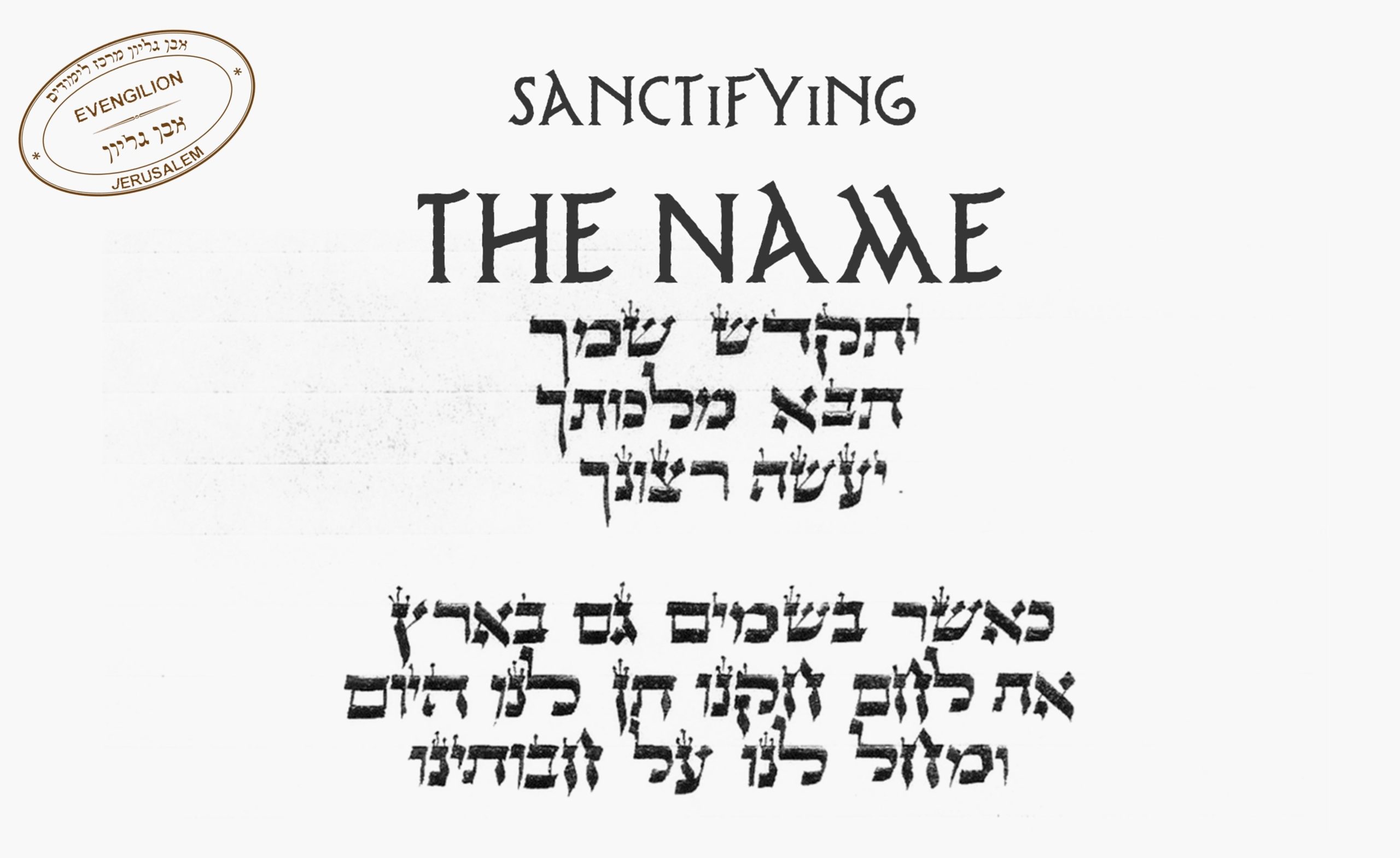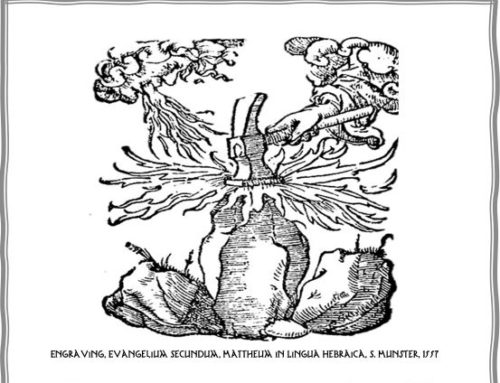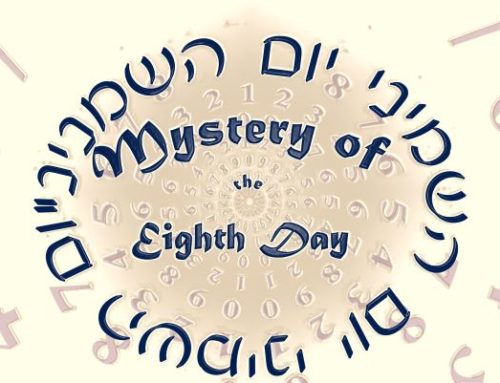Torah Portion, Emor, Leviticus 21.1-24.23, Haftarah, Ezekiel 44.15-31
“And you shall not profane my holy name, that I may be sanctified among the people of Israel. I am the Lord who sanctifies you.” Leviticus 22.32 ESV
I sat in the home of my friend Moshe, a Torah Scribe, and follower of Yeshua. He had prepared a gift, The Lord’s Prayer written in Hebrew on parchment.
אבינו שבשמים יתקדש שמך
Avinu sh’bashamaim yitkadesh shimchah,
“Our Father who is in Heaven, may your name be sanctified”.
Immediately I read the powerful words of the first petition. They were not for help, daily needs, or even forgiveness. The first petition was for the sanctification of God’s name! Many miss this as a petition thinking, “Hallowed be your name” is a praise. The Greek of Matthew 6.9 however is future tense. “May your name be sanctified”, matches the next petitions, “May your kingdom come; may your will be done.” This is also how it is translated into Hebrew. Why would Yeshua want His followers to pray for the sanctification of God’s name? The sanctifying of God’s name is tied to the restoration of Israel. (Ezek. 36.16-31) God’s people are charged to represent Him to the world. When those called by His name are not in right relationship to Him, God’s name is profaned among the nations.
To understand the importance, let us go back to our Torah portion, Emor, from Leviticus. Though Moses instructed the people saying, “You shall not profane my holy name.” a man within the camp blatantly cursed God’s name, causing Moses and the elders to intreat the Lord as to what should be done. What motivated that young man’s blasphemy is being manifest in our generation today. And so, for the next few moments let us ask, How can we sanctify God’s name, and how will this hasten the salvation of “all Israel”?
I. You Shall Not Profane my Holy Name
“And you shall not profane my holy name…” Lev. 22.32 ESV
Jewish believer, Moses Margolioth, in 1876 wrote that this first petition in Yeshua’s prayer was a test on the genuineness of our faith. Just as there are tests to determine if something is genuine gold, so this first petition is a “crucial test” to “assure ourselves that God is our Father”.[1] If we claim His name, yet we profane His name, our actions testify to a broken relationship with our Heavenly father.
What then does it mean to profane the name of God? When we live outside of covenant relationship, yet claim to belong to God, we profane the Name in the eyes of the world. Ezekiel reminded Israel that their mere exile to a foreign land caused the nations to profane God’s name.
“And I will sanctify My great name, which has been profaned among the nations, which you have profaned in their midst; and the nations shall know that I am the Lord,” says the Lord God, “when I am hallowed in you before their eyes.” Ezekiel 36.23 NKJV
The Lord promised that he would sanctify His holy name by returning Israel to the land. But simply returning would not be enough. Israel had to be sanctified, washed, and restored to right relationship. (Ezek. 36.24-28) When the world witnesses our sanctification, our being set apart in holiness, God’s name is also sanctified. When we live in a spiritual “exile” of rebellion, yet claiming to be His, the world takes note to profane God’s name. In a great sense, praying for the sanctification of God’s name is a prayer for the restoration and salvation of Israel.
II. Sanctified Among the People of Israel
“That I may be sanctified among the people of Israel.” Lev. 22.32 ESV
Let me expound on this thought for a moment. The word for sanctify comes from the same Hebrew word for holy. Literally, something being made holy. But what does holy mean?
The Barna group made some surprising findings in a 2006 survey on holiness.
“Holiness is a matter embraced by the Christian Church, but it is not one that many Americans adopt as a focal point of their faith development…barely one-third of Americans (35%) contend that “God expects you to become holy.” A larger share of the born again public believes God has called them to holiness (46%) but that portion remains a minority of the born again population.”[2] Barna, 2006
Holiness is separating from sin and being set apart unto God. In one sense, God is always in a state of holiness, and yet He desires that His name be sanctified or set apart, by the faithful testimony of our lives. Are we guilty of profaning God’s name by refusing to live a holy or consecrated life?
Sanctifying God’s Name
Israel bears the name of the Almighty. Israel means “prince with God” or the “upright (Yashar) of God”. Non-Jewish followers of Messiah become part of the commonwealth of Israel. (Eph.2.11-13) By extension, they also bear God’s name to this world. Most nations are known by some distinguishing geographic, political, historical, or ethnic identity. Israel alone is identified as belonging to the Almighty. Those who bear the name of God must also walk worthy of the Name. But not only are we to pray and work toward the sanctification of the Lord’s name, we are also sanctified by the Lord.
III. The Lord who Sanctifies You
“I am the Lord who sanctifies you.” Lev. 22.32 NJKV
In a great sense, our sanctifying and being sanctified, describes our relationship to God within the language of marriage. His pronouncement of sanctification is echoed in the bridegroom’s loving oath spoken over the bride. Words which she can accept or refuse.
“הרי את מקודשת לי (בזה)”
“Harei at mekudeshet li b’zeh”
“Behold you are consecrated to me in this…”

A Jewish wedding (Jozef Israëls, 1903)
In modern Jewish weddings, the article of consecration is a ring. In ancient times it could be a coin or even a cup of wine. The bride was sanctified or set apart unto the bridegroom not simply by his words but also through a guarantee of devotion, an article of value, from the groom to His bride given in front of witnesses.[3]
Yes, even a cup of wine from the groom to his bride was sufficiently valuable to sanctify her. This cup of Kiddush or sanctification is also remembered in the modern Jewish wedding. The New Testament consistently speaks of Yeshua as the Bridegroom. The significance of His offer of the cup to His followers at the Passover could be seen in such a light. Messiah’s cup of salvation is a guarantee of betrothal, sanctifying or setting apart a people called by His name.
“Then He took the cup, and gave thanks, and gave it to them, saying, “Drink from it, all of you. For this is My blood of the new covenant, which is shed for many for the remission of sins.” Matthew 26.27-28 NKJV
It is not a stretch to understand the Last Supper as a betrothal meal. Our acceptance or right of refusal determines our place in the Kingdom. One day the betrothal cup will be completed at the Wedding Supper of the Lamb. (Rev. 19.6-9)
Conclusion
“Now an Israelite woman’s son, whose father was an Egyptian, went out among the people of Israel. And the Israelite woman’s son and a man of Israel fought in the camp, and the Israelite woman’s son blasphemed the Name, and cursed. Then they brought him to Moses. His mother’s name was Shelomith, the daughter of Dibri, of the tribe of Dan.” Lev. 24.10-11 NKJV
This Torah portion has focused its lens upon the sanctification of God’s name and our sanctification as a people called by that name. But now we must conclude by examining the life of a man who abandoned and blasphemed God’s name. It is ironic that even though his mother is mentioned specifically, his name has been purposely forgotten.
The text goes reveals him as the son of a Jewish mother and Egyptian father. Might this explain his actions. He held one foot in the camp of Israel while struggling with animosity. This young man exemplifies many today. Though raised with Biblical values, they rebel against their upbringing. His fight with the Israelite man brought out his internal battle against God. Similarly we see verbal attacks from many against Israel and true followers of Yeshua. They fight in the camp of courts, media and world legislatures. Though easily triggered, their fight is not really with Israel or the Church. Like this young man in our text, they are struggling against God, blaspheming the only Name by which they might be saved. This young man is a warning in these end times. A time which the Psalmist wrote would come.
“The kings of the earth set themselves, and the rulers take counsel together, against the Lord and against his Anointed, saying, “Let us burst their bonds apart and cast away their cords from us.” Psalm 2.2-3 ESV
Tragically, judgement came swift for the young man. His end is a warning for any who blaspheme and curse the Lord’s name.
Yeshua taught His followers to pray for the sanctification of God’s name. When we pray that prayer, we align ourselves to not only to be a part of the sanctification of the Name, but to also be sanctified by Him. We are mekudeshet to Adonai. In that we have received His guarantee, both in the cup and the Spirit of God we belong to Him. May we sanctify His name unto the day the Bridegroom returns for His bride.
Shavua Tov from Zion
[1] Moses MARGOLIOUTH, The Lord’s Prayer, No Adaptation of Existing Jewish Petitions. Explained by the Light of “The Day of the Lord” in a Series of Six Essays. To Which Are Added Three More … on the First Two Prophecies, and on the Cherubim. By … M. Margoliouth (London: Samuel Bagster and Sons, 1876), 34-35.
[2] “The Concept of Holiness Baffles Most Americans.” Barna Group, February 20, 2006. https://www.barna.com/research/the-concept-of-holiness-baffles-most-americans/.
[3]“Mishneh Torah, Marriage 3:1,” Sefaria, accessed May 2, 2021, https://www.sefaria.org/Mishneh_Torah%2C_Marriage.3.1?vhe=Wikisource_Mishneh_Torah&lang=bi&with=all&lang2=en.
“How is a woman sanctified (for engagement)? If one choses to do so with money (or its equivalent), it cannot have less than the value of a “Peruta”. He says to her, “Behold, you are sanctified to me”, “Behold, you are engaged to me”, “Behold, with this, you are to be my wife”, and he gives her the object in front of witnesses. The man must be the one to say words that have the meaning of an acquisition, and it must be he that is giving her the money.”





